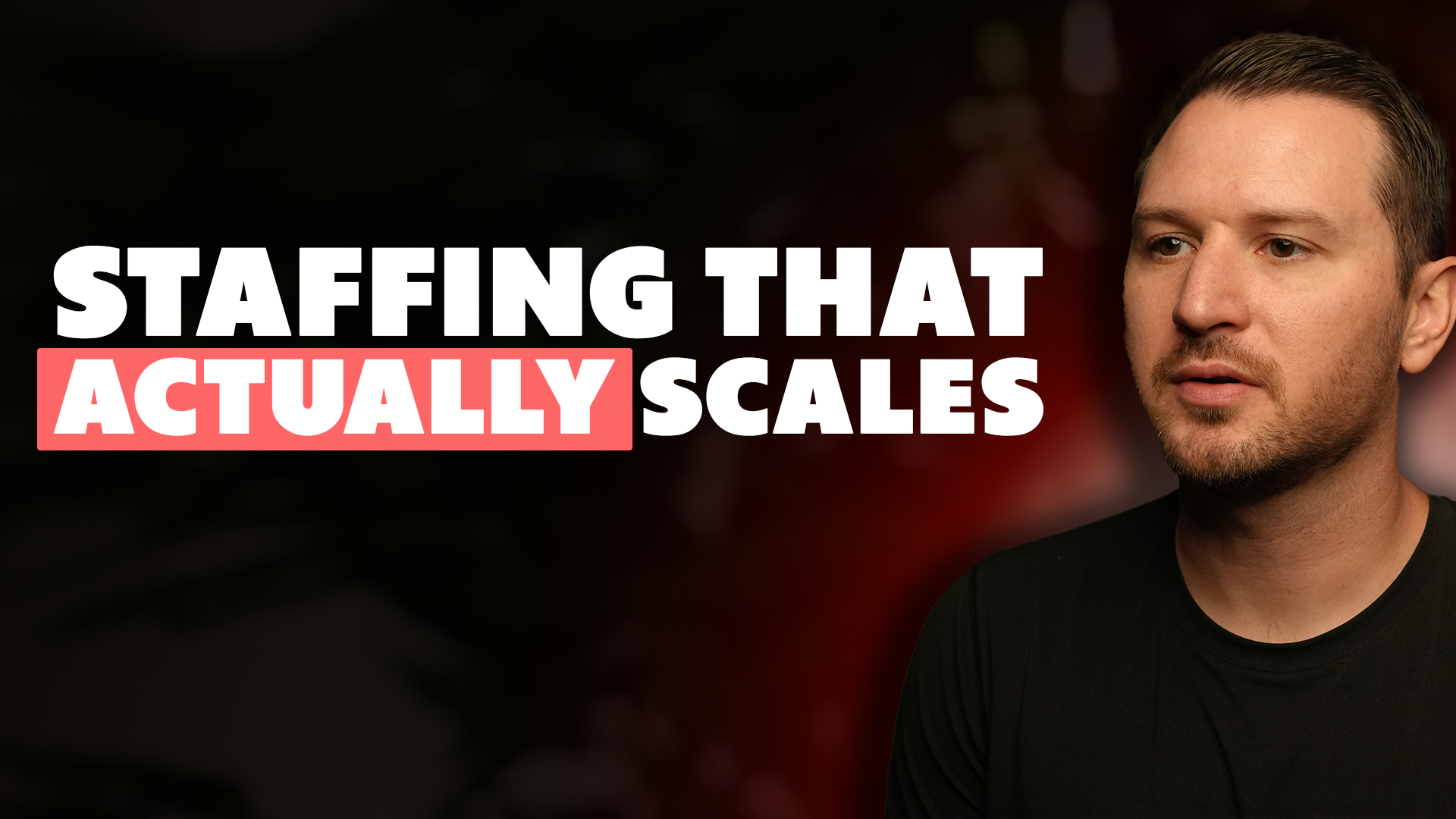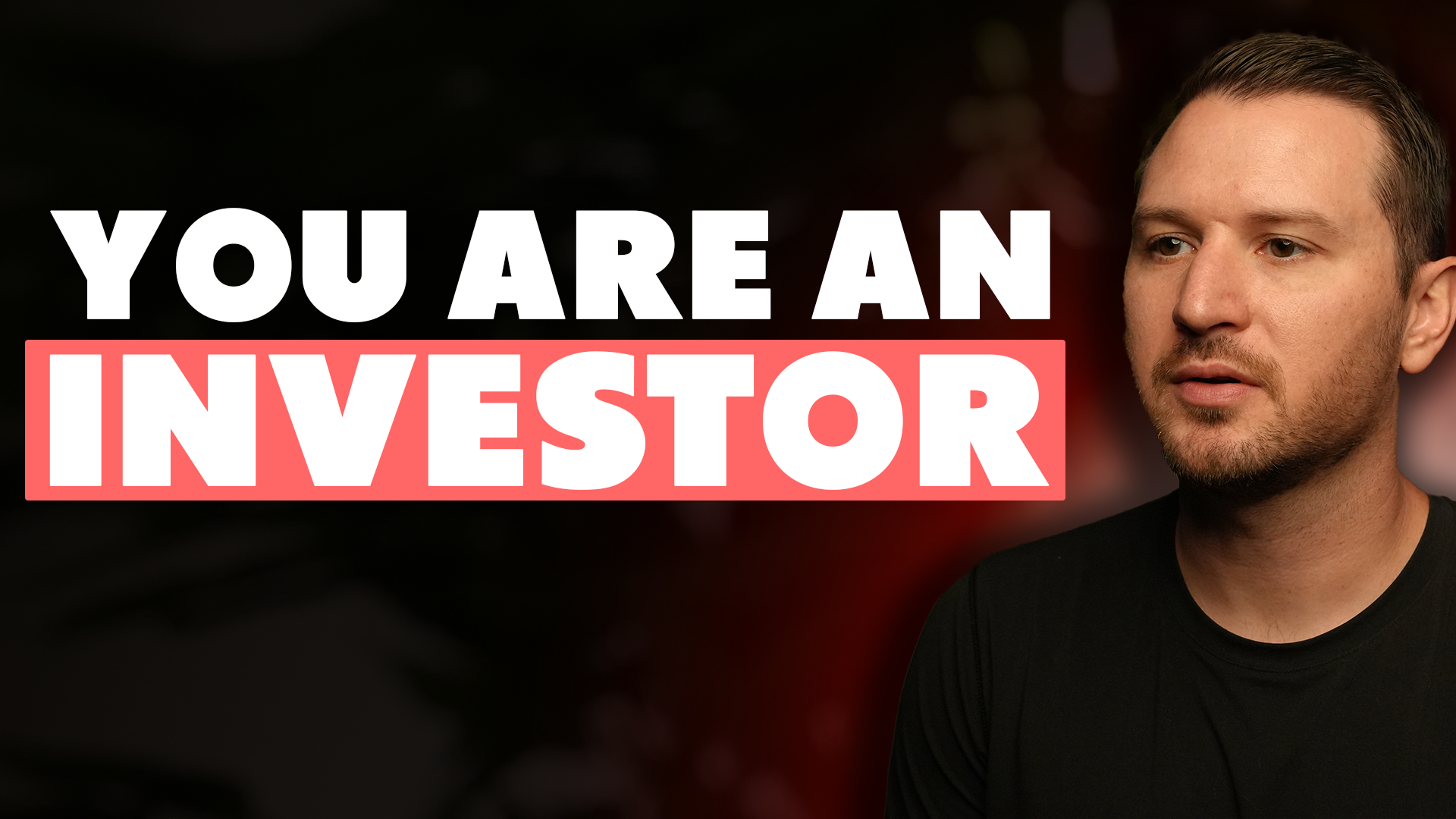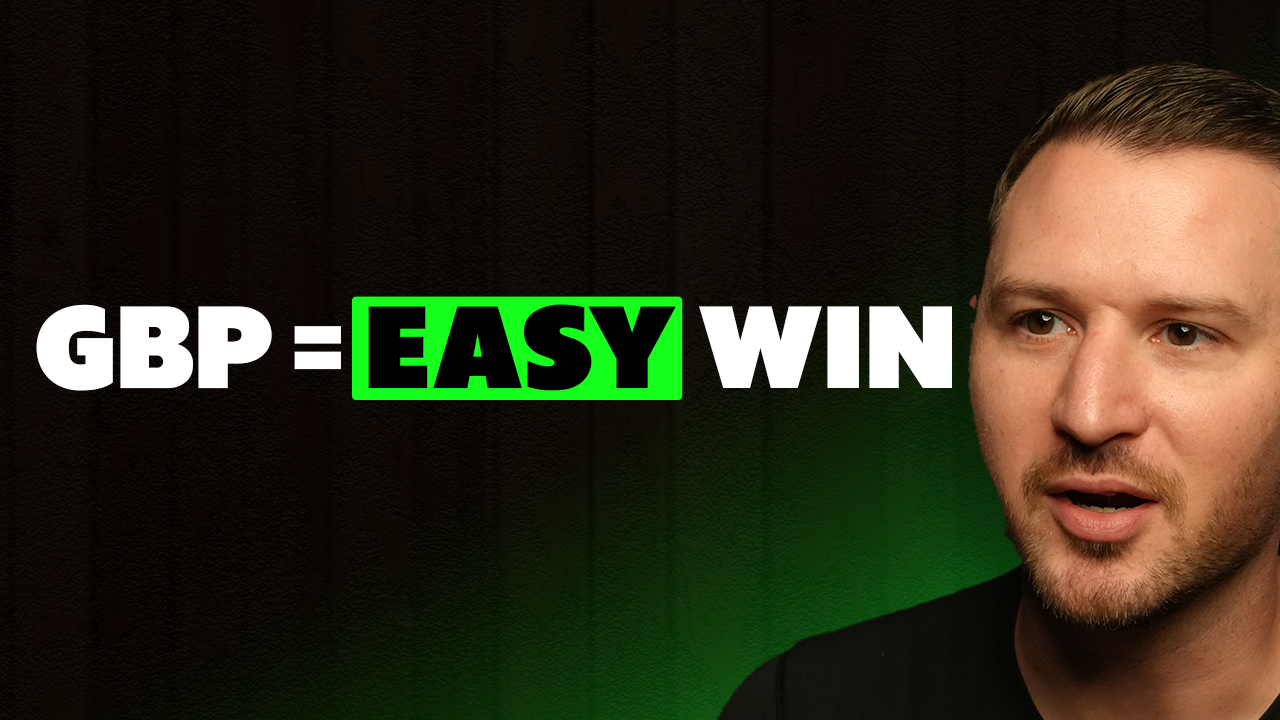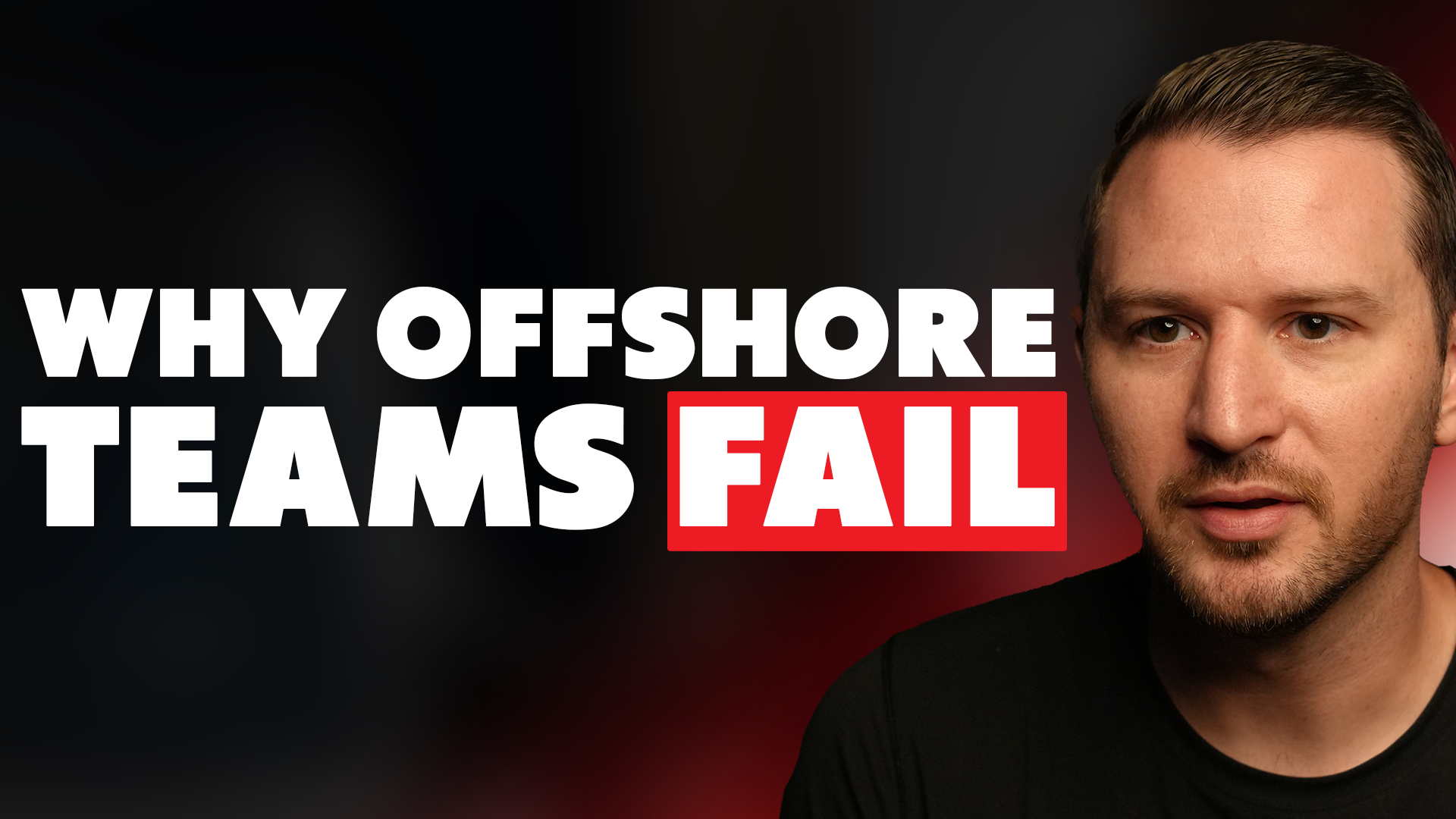What happens when your Home Service Business ownership hits disaster, and how do you survive business hardship? Hard questions this week, as Owned and Operated hosts Jack and John tackle a question from their private business owner group on Facebook to talk about navigating the murky water of when things go badly for your business. John also talks about the challenges of managing a business in hard times, such as deciding to shut down parts of the operation to focus on large projects, as well as the benefits of incentive trips for employees.
Episode Hosts: 🎤
John Wilson: @WilsonCompanies on Twitter
Jack Carr: @TheHVACJack on Twitter
Looking to scale your home service business? Service Scalers is a digital marketing agency that drives success in PPC and LSA.
Discover more growth strategies by visiting Service Scalers: https://www.servicescalers.com
More Ways To Connect
The Owned and Operated Weekly Insights Newsletter
John Wilson, CEO of Wilson Companies
https://www.wilsonplumbingandheating.com
Jack Carr, CEO of Rapid HVAC
https://rapidhvactn.com
Owned and Operated Episode #124 Transcript
John: I'm John Wilson. Welcome to owned and operated. Twice a week we talk about home service businesses and if you're a home service entrepreneur then this is going to be the show for you. We talk about our own business in residential plumbing, HVAC and electric and we also talk about business models that we just find interesting.
John: Let's get into it.
Jack: Are you currently dumping? Money into the PPC pit of despair. Well, that's how I used to feel before I started working with service scalers. I would waste money with two, three, four other agencies. Then I started working with service scalers and they were able to drive meaningful leads in my business. And now it's one of our cheapest paid lead generation platforms.
Jack: They specialize in PPC, SEO, and LSA management. So if you're looking to increase meaningful leads in any of those areas, I would give them a shout out and see what they can do for you.
John: Welcome
Jack: back to Owned and Operated with your host John the Madman Wilson. I'm not sure I like that one. We'll try something else next week.
Jack: Yeah,
John: we'll try it. Before that it was a
Jack: flawless
John: execution.
Jack: Flawless. Flawless. How's your week going? Dude, it's uh, we're turning the cruise ship slowly. So I think we talked last week about shutting down a very large portion of our business, which you actually ironically talked about today on Twitter. Um, and then we're like closing out all of the large projects that we have.
Jack: So we're actually not taking any service work until June 3rd. Like that's how many large projects that we had sustained. Oh yeah. Yeah, that's the best. And built up. So we had to like pull all these guys off and kept pulling them off these big jobs I just have so many of them that like with service work We were estimating that we'd be out past July on plumbing like two months three months.
Jack: That's crazy. Yeah So we've just stopped all service work. We're just focusing on finishing up jobs. We have some subs that are bringing in but We're turning it slowly, but surely. How are you doing? Yeah.
John: Good, man. We just got back from, uh, we have like an, uh, incentive trip. So for like core value, uh, winners, which is like a cool thing.
John: Like you can vote your peers as like, they are the best of us or people that like exceeded numbers by a long shot, get invited to an annual trip. So this was our sixth one, uh, second time in Mexico. It was a ton of fun. So we had a group of, uh, I think 21 folks down there and got
Jack: to hang out in Mexico for the weekend.
Jack: So it was sweet, dude. That's awesome. That's so cool. I mean, that's, that's like the definition of, I don't want to say made it, but like, like that's what the, one of the coolest things about owning a business is, is you can offer that to your employees winning together, actually winning together.
John: Yeah. Like I want to go, I want to go to Mexico.
John: So yeah, no, it's, it's been good. So this was our sixth one. First one we did when we were like smaller than you. Like 3 million of sales. First time we did it. Um, but yeah, so feeling, feeling good. And it's 91 degrees. So feeling really good
Jack: buddy. Yeah. I feel really good about that.
John: Loving it. So today's episode, uh, we had an, we had a question come up, uh, and it's a It's a difficult question.
John: So we thought we'd sort of handle it inside an episode. Um, and it came up in our Facebook group. So if you're not a part of our Facebook group, I encourage you to search it. It's plumbing HVAC and electrical business growth hosted by owned and operated. Um, we launched it a couple of weeks ago. It's getting pretty active, which is cool.
John: Like good questions, quality questions. Uh, it's been fun to engage and all types of business ranges. Mm. Um, So the, the question was, I'm just going to read it out and then we'll tackle it. If you had limited runway in your business and struggled with lead gen. Would you, A. Decrease marketing to increase runway, B.
John: Have a small but very focused marketing budget, C. Increase marketing to increase lead gen, Uh, and then he follows up with, I see the following problems. 1. Slow death, 2. Not knowing where to focus, and 3. Wasting money. It not actually leading to more leads and dying faster.
Jack: Absolutely fair question. And I think one that we all go through at one point in owning a business.
Jack: And I know in my mind, it's definitely happened to me before where you hit times that are hard. And so the idea is like, well, we're spending 10 percent on marketing. Why don't we just turn that off and save some money? Um, but that being said, the slow death is a real thing. Um, I'm going to start because I think my answer is more basic.
Jack: I'll let you kind of see what your answer is. Um, wait, my, my first basic answer is if you have small runway, my guess is the business is kind of small, right? Sub 1 million, uh, maybe sub 2 million.
John: So this
Jack: specific business I believe is a startup franchise. So that, that's where I was going to guess it's like, you're really new.
Jack: So you don't have the runway to dump three, six, 7, 000 a month into PPC or LSA. Um, so my first and, uh, my favorite advice in this instance in marketing is There is so much opportunity to get to above 1 million in revenue. That's absolutely free next door. Um, and Facebook groups. I've seen multiple service businesses grow to being above 1 million.
Jack: only using those two platforms. That's it. And it's because you're able to, these guys are hustlers in those platforms though. Like every time someone says, Hey, I need plumbing or I need help with HVAC or I need an electrician to do like they're the first ones. Um, I recently have a buddy who's does drywall pressure washing the whole nine.
Jack: And he's up to in three months, he's up to 90 reviews on next door. And I asked him to do some work for me. He's like, Jack, I appreciate it, but I can't, man. I'm full. And so he's actually filled up his schedule for free, just exchanging his time to say, Hey, try me out. Please leave me a review on this platform.
Jack: So that's where I would start. And then my only second advice is the minute that you do start spending money, make sure that it's not branding, it's direct, it's lead gen. So you need to be like LSA was probably my first choice. What do you
John: think? If you like what we talk about on our social media, on Twitter, on this podcast, then you should be signed up for our newsletter.
John: Go to owned and operated. com where every Friday Transcribed We break down our business. We break down insights, things we're learning, things we're working on, and it's good stuff. Check it out. Owned and operated. com. Um, yeah, like that was good. I think, um, there's been plenty of times and granted, this is like a startup.
John: So. But I think it's the same, it's the same problem. Like I could have the same problem today as this.
Jack: Yeah.
John: Uh, so like, you know, obviously different business scenario, they're a startup. Uh, and I, and I think at a highly competitive market, um, and I'm not a startup, but like the same problem could happen where like we have to double down and get it done.
John: I think, I think it happens a few times. Um, As you grow, I know it did for us, where we had to make what we felt like was tough choices. And the way that I've used, like, if you have limited runway, then like, first thing you need to do is extend your runway. Um, cause like nothing matters if the business dies, like nothing matters.
Jack: Fair enough.
John: So I would be looking at like, what can I absolutely obliterate cost wise to make it so that way, um, when things do come back, I'm prepared. Cause like waiting it out while the business. One of the options was slow death, like waiting it out while there's a slow death is not an option in my mind.
John: So if you're in a highly competitive market, um, like, and if time's your enemy, like, cause in this case, I think time is the enemy. So if time is your enemy and if you're not getting better every day with more time, then you have to buy yourself time. So I don't think it's decreasing marketing budget. I think like he didn't bring up anything else aside from marketing budget, but I think it would be like, what can you cut out?
John: Like, what can you just get rid of? Uh, is there overhead that you don't need? Is there an in person CSR that you can take overseas? Is there like, what, how can you save 10 to 15 grand a month? Cause if you're a startup, even like two or three grand a month matters cause that's rent. Um, Can you move out of the place you're renting sublet it and like run out of your house and like, I think it would, you know, people want to get up to a million or 2 million or whatever as fast as they can, but like, you'll never get to a million if the business goes to zero.
John: So like you just have to make some really shitty choices, but you can recover in six months to a year. Once you figure out your lead flow. Cause like, I agree with you that what you said is probably the right move here. But like, if time is your enemy, then like you have to execute flawlessly over the next three days in driving next door leads.
Jack: Yeah. I think the answer is, is a bit of a mixture. So like, for example. This is not, and like, this is an issue we had. And I mean, we've been in business two years, so like we've had it recently where we went into a slow season and our answer, my actual answer of what I did when this thought came into my head was we paused SEO, right?
Jack: SEO is not actively generating like website content. It might, it might do like one or two leads a month, but in comparison, we can generate that somewhere else. The other thing that paused was my salary. So that was the first thing that we cut Jack's salary. If you knew my w two last year or two years ago, last year, last year, it'd be pretty dismal actually.
Jack: And cause I cut out two months of HVAC only shoulder season before I locked it down. And so the answer is, is yeah, you're right. But I think it's a bit of both. It's a bit of both. It's, it's one, you try, you try to keep marketing, but you get rid of all the marketing that is not directly generating leads while hustling the other side, spending that time that you're not running calls to go network, like go to a BNI, go to networking groups.
Jack: Yeah. Um, I don't care. You know, I think it's a next star initiative, but like, there's one where you could, the hello campaigns where you're standing on this, this corner of the street with your team, you know, um, not essentially flipping a sign, but just waving at people. Like it's, it's using that time to really that you're not working to not have anxiety about it, but actually go out there and do something, do something creative.
Jack: Um, so, yeah, I mean, I, no, I
John: mean, I, I agree. And I think we've, this is, um, I was talking to my wife about this. I think this is the first year like 2024 that I didn't trim my salary during slow season. Like this is the first one. So anyone that thinks it gets better, um, it takes a while to get better. Uh, so, Yeah, it takes a long time.
John: Um, but yeah, like you have to, you have to cut, like you have to find dollars inside your business so that you can survive. And I think like as the business gets bigger and as it gets more sophisticated, you can rely on budgeting and you can build a bigger buffer. But if you're early stages, then it would be like What am I spending a single dollar on?
John: That's not driving a lead. And like, how do I not spend that dollar? Sometimes that's people, sometimes that's rent. Sometimes that's you. Um, it can be across the board, but I will say that like the muscles that he learns in this early stage is going to serve him well, because he's going to deal with this again.
John: Like it's going to happen again.
Jack: Yeah, definitely. Do you think that there's, um, an important concept here that we're skipping over to is, um, Do you preplan for this stuff? Like in my head, I have a list of items I'm going to cut. If we don't hit numbers, we need to hit and like in order. And yeah, we've had a
John: disaster plan before we've run it for years.
John: Um, it's a bit outdated now. Um, yeah,
Jack: yeah. So I mean, I, I think that that's important too, is, is being ready. I mean, I don't, I don't want you to, or people listening in general to, to always be thinking of the worst and the most negative thing, but I do think it's important. I think you should. Yeah. I mean,
John: survival is the only thing that matters.
Jack: Exactly.
John: Like, businesses only get to three generations because they survived to three generations. Like, that's it. So, I, I think you should, like, I've always had the worst case. Um, and I sincerely think that that's why the business has survived to three generations. While I've had it, because we've grown tremendously, but like, I have a, like a lot of paranoia about, oh, this could happen, this could happen, this could happen.
John: And then like, the thing is it, most of it ends up happening, but like, you can act pretty quick if you're paranoid.
Jack: Yeah, it's, and I mean, I think the process is important too, because you don't want to make rash decisions either. Right. So like one of the areas that we chew on, if this situation were to happen, it's like, could you cut out service time?
Jack: Service time is a huge cost. You can't cause you're way too big. We potentially are at a spot where we could shut it down and like move to something else. Um, but what would that fallout be? What would the repercussions be of that? And so the answer is like, no, we probably shouldn't unless it's a worst case scenario.
Jack: But I've walked through that about three or four times just because it's so expensive. So the way,
John: the way we think about it is, are you going to break skin or are you going to break bone? So, neither one's the right or wrong answer. It just depends on how big the issue is. But like, Breaking Skin is, um, Like you bleed, you bleed a little bit.
John: And, but like in a couple of days, the bleeding is going to stop. You're going to be fine. So like it's small actions. So like small actions could be reducing service Titan. Um, no, actually that's probably a big one.
Jack: That's probably a big one. Yeah.
John: Yeah. So like, Hey, like your salary isn't going to impact the business.
John: Like there's no rebuild time to Jack's salary turning back on or like SEO, like it'll impact the business, but it's not going to like. You can, that won't take six months. You know, you're just going to like, it's going to be a blip. So that's breaking skin. Breaking bone is like, I'm going to kill my call center.
John: Cause I need to create 80 grand a month of free cash. Uh, that's breaking bone. That's going to take us, that's going to take a lot of time to rebuild or like terminating managers. That's going to take a lot of time to rebuild. Um, That's a, that's a year long, you'll take three to four months to switch to a new software and then you'll take, you know, you'll run it and then you'll switch back to service Titan when funds get back.
John: So that's breaking bone where it's like, now, granted, I'm, I'm not advocating to not break bone. Like we have plenty of times. Um, Like if something, if something bad happens, like we run the same playbook, like we build runway as fast as we can. Cause the only thing that matters is the business arriving.
Jack: It's like a, that was a movie at 28 days or something where, where the guy gets stuck and has to cut off his own arm. Yeah. If you got to do it, you got to do it. Yeah. I mean,
John: we're, um, over the years, I haven't enjoyed it, but like first, first time I ever did layoffs, I was 26 and we had to figure it out. Um, yeah, we figured out a lot since then.
John: But like, my point is, uh, to the guy asking this question is like, if you don't have runway, you have to build runway. As fast as you can, because surviving is the only thing that matters. Uh, like nothing else. There are no other moves if you don't survive. Um, uh, and it's going to be ugly. And then as you rebuild, like you'll need those same skills.
John: Cause we've had to do that. times. I don't even know. Like we've had to do that plenty of times. Um, just jump on it.
Jack: I mean, I, I think that's, this whole concept has been really good advice. It's exactly what I would say to somebody who was in the situation. So, um, I mean, I get it. I'm sorry. Like, we've been there too.
Jack: I think everyone's been there. It sucks.
John: Yeah. Yeah, it is. Yeah. It's definitely hard. It's, um, I don't know. It's what happens when you get punched in the face. It's the this is it, man. This is the, this is the hard thing.
Jack: Yeah. Sweet. Well, yeah, that, that ended on a, a real nice, uh, positive note. .
John: Well, yeah. I think like it get, I think it doesn't get better.
John: It's just that you learn how to deal with it. Like you build a little internal playbook in your head of like, okay. Um, so like in the past, you know, 60, 90 days, like we've had to free up cash because April was weird and like, we freed up 50, 60 grand a month. Um, and some of that's like software negotiations, some of that's vendor negotiations, some of that's like rebates.
John: Um, And I don't think we're done. Like, I think we have more to go. Um, but it really unlocks and then, you know, you do it and you're like, man, I should, we should be doing that more often. But, um, but like we got vendors to give us special rebates to continue buying during everyone's slow season. Uh, we got massive discounts on key vendors.
John: Um, because we're like, Hey, we're, we're going to switch. Like we're now shopping you. And we found out that your competitors are half the price. So like, what are we going to do about this? Uh, Verizon was one of them.
Jack: So
John: just like cellular. So you just pick the biggest line items on your P& L and you just like chase them down.
Jack: I mean, I think that's, that's the answer for when you get bigger. You can go find those nickels and dimes that add up when you're, when you're tiny. Well, I guess from a percentage basis, it's still the same.
John: Yeah. As a percentage, it's still the same. Yeah. For me, that's. That's 3 percent of revenue. So, but
Jack: I mean, my point is right, if you're trying to make, you have a debt service of like 500, just super low amount, like saving a percentage, 30 is a lot less valuable to go renegotiate a contract with Verizon for your two phones than it is to go find a new client and make 500.
John: Yeah.
Jack: Power wash two trucks, go knock doors, like go hustle your way to get that versus when you have 200 tablets, then it's like, okay, now, now this 30 times 200 makes sense.
John: Yeah.
Jack: Um, percentage base, like, yeah, it's the same, but from an act, I forget it was, um, the restaurant guy on, on Twitter was talking about this day.
Jack: He's like, yeah, percentage looks good on paper. But the actual cash in your account feels a lot better. And I get that. Um, so sorry if I butchered that, the restaurant guy, you're not anyway. So, yeah.
John: Oh, man. What happens when you get punched in the face? Uh, I hope that we provided a little bit of value for anybody out there currently getting punched in the face.
John: Thanks for tuning in to owned and operated the podcast for home service entrepreneurs If you enjoyed today's episode, please hit the like button and subscribe to the podcast If you have any questions or topics you'd like us to cover feel free to reach out You can find me on twitter at at wilson companies.
John: I'll see you next time
Get more Owned and Operated on YouTube, on Twitter, or with our weekly newsletter.







.avif)
